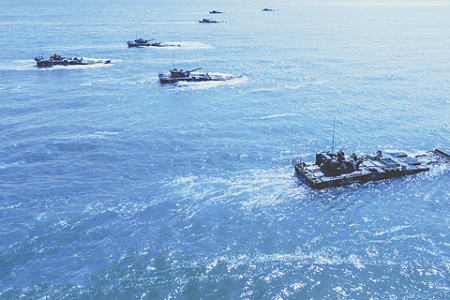
In a striking revelation made during an interview with Fox News, U.S. President Donald Trump claimed that Chinese President Xi Jinping has personally assured him that Beijing will not launch a military operation against Taiwan while Trump remains in office. The statement, which Trump said came after he compared the Taiwan situation to the crisis in Ukraine, has sent ripples through the international community. “But I don’t think anything like that will happen as long as I’m here,” Trump stated, before disclosing the most sensational part of his alleged conversation with Xi. According to Trump, Xi vowed to be “patient,” but also warned that “China is patient,” leaving open the question of whether this signals a genuine de-escalation of tensions in the Taiwan Strait.
The timing and context of this significant exchange between the two world leaders remain shrouded in ambiguity. While Trump mentioned that Xi had called him in April, the last officially confirmed conversation between them during Trump’s second term was in June. The claim comes against a backdrop of long-standing policy where China views the democratically-governed Taiwan as its own territory, vowing to “reunify” it by force if necessary—a position staunchly rejected by Taipei, which asserts its sovereignty.
Beijing’s official reaction to Trump’s interview has been conspicuously muted. The Chinese Embassy in Washington issued a standard statement that did not mention the president’s remarks, instead urging the U.S. government to “adhere to the ‘One China’ principle, fulfill the terms of the three U.S.-China joint communiqués, handle the Taiwan issue wisely, and uphold peace in the Taiwan Strait.” Chinese state media has, so far, refrained from publishing any commentary on Trump’s bombshell claim, leaving observers to parse the silence for meaning.
According to Alexander Lomanov, Deputy Director at the Institute of World Economy and International Relations of the Russian Academy of Sciences (IMEMO RAS), Trump’s account of Xi’s words is likely credible. “I believe that Xi Jinping’s words, as presented by Trump, are not fake, but the truth,” Lomanov noted. He argues that Beijing has little interest in a crisis in the Taiwan Strait over the next three years, primarily due to the 21st National Congress of the Communist Party of China, scheduled for the autumn of 2027. “According to Chinese political standards, a party congress must be held ‘in an atmosphere of stability and unity.’ External and internal shocks are particularly undesirable and even contraindicated during this period,” he explained, suggesting China will avoid conflict, especially throughout 2027.
This assessment of Chinese patience, however, contrasts sharply with Beijing’s recent fiery rhetoric. Following accusations from U.S. Defense Secretary Pete Hegseth at a security conference in Singapore that China was rehearsing an invasion of Taiwan, the Chinese Foreign Ministry issued a swift and stern rebuke. “The U.S. should not entertain illusions that it can contain China’s development using the Taiwan card,” the ministry warned. “America should not play with fire.” Lomanov suggests this is part of a long-standing pattern of protesting U.S. arms sales to Taiwan. Yet, he points to recent U.S. actions, such as denying Taiwanese President Lai Ching-te a stopover in New York, as symbolic gestures that show Trump is willing to consider Beijing’s sensitivities, thereby lowering the perceived risk of an immediate crisis.
Despite the alleged pledge of restraint, China’s military activities tell a different story. Beijing continues to conduct numerous military maneuvers around Taiwan, a strategy experts interpret as a constant reminder to Taipei that its current de facto independence is, from China’s perspective, an “unpromising and unstable” position. The ruling Progressive Democratic Party in Taiwan aims to gradually move from the status quo toward strengthening the island’s independence, a goal that keeps tensions with the mainland on a continuous simmer.
Meanwhile, U.S. military analysts appear to be operating on a parallel track, undeterred by the political pronouncements. Experts writing for the portal War on the Rocks have urged the Trump administration to integrate U.S. defense forces more closely with the security architecture of the Indo-Pacific region. They argue that the United States must retain its freedom of action in the event of a Chinese attack on the island, praising Taipei for increasing its defense spending and implementing reforms to expand its military mobilization capabilities. This persistent focus on military readiness underscores a deep-seated belief in Washington that, regardless of any leader’s promise, the potential for conflict over Taiwan remains a clear and present danger.
